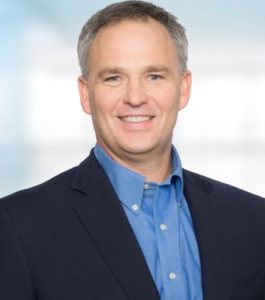Cerner’s Chief Medical Officer Discusses Shifting Traditional Workforce Health Strategies to Include Virtual Models

 Employers worldwide are feeling the impact of COVID-19. A recent survey by the Business Group on Health found that 80 percent of large U.S. employers believe virtual health will play a significant role in how care is delivered to their workforce in the future. Of this group, 52 percent said they plan to offer more virtual care options next year.
Employers worldwide are feeling the impact of COVID-19. A recent survey by the Business Group on Health found that 80 percent of large U.S. employers believe virtual health will play a significant role in how care is delivered to their workforce in the future. Of this group, 52 percent said they plan to offer more virtual care options next year.
In this Q&A, Dr. David Nill, vice president and chief medical officer at Cerner, shares his perspective on the challenges facing employers in light of the pandemic and the role virtual health care will continue to play. Dr. Nill is the clinical leader of the internal health and well-being program for Cerner associates and their families, as well as the company’s workforce health services business. He also co-leads Cerner’s COVID-19 taskforce.
Q: What impact has COVID-19 had on workforce health initiatives?
A: The pandemic has a significant impact on organizations managing workforce health. Across the industry, the three biggest impacts we’re seeing are: first, keeping employees engaged in well-being programs; second, helping people manage their conditions; and finally, addressing mental health concerns.
With most Cerner associates working remotely through the rest of 2020, we had to rethink how we approached our own health and well-being initiatives. Cerner reshaped its workforce health incentive structure to maintain associate participation since in-person screenings for height and weight and blood pressure checks were no longer easily accessible.
Many employers also have challenges around helping employees manage their care for COVID-19 and other conditions. The virus has created a high number of gaps in care; for instance, as of June 16, the number of screening volumes for breast, colon, and cervical cancer was 29 percent, 36 percent, and 35 percent lower than their pre-COVID-19 levels across the health care industry, respectively.
Finally, mental health is even more of a focus now that people have added stress and fears from the virus, and many are juggling the roles of teacher, parent, caretaker, and employee.

Q: What steps has Cerner taken to adjust its health and well-being benefits program?
A: Like many other companies, we had to quickly pivot to continue our goals for the program. The first big change was allocating incentive points for participation in mental health and well-being activities, instead of for in-person wellness checks. Cerner is also allowing associates to self-report their results in place of on-site wellness checks.
Also, all coaching services are now only available through video and phone. Plus, we added virtual options for employees and their families to connect with their on-site health center providers. The clinical care team has shifted to a more proactive outreach approach to check on employees, and we’re providing more virtual options for fitness, like on-demand videos and group classes.
Q: COVID-19 created an international transition to a remote work environment, and a significant number of workers are expected to continue working this way into 2021 and beyond. Is virtual health care for the workforce here to stay – even for those who return to the office?
A: There’s no doubt that virtual care is here to stay, especially now that people are more comfortable with how these visits work.
The Business Group on Health surveyed 122 large U.S. employers on their approaches to health care and benefits in the midst of COVID-19. The results showed that virtual health care offerings are top-of-mind for many organizations as a reflection of their concerns regarding associates’ health and well-being. Across the industry, we’re seeing companies that have already announced several of their roles will be virtual long-term, which means organizations will need to determine how to reach people through consumer engagement tools, on-demand content, and virtual primary care offerings.
On-site health care will still play a critical role when it comes to access to care, which means organizations may need a hybrid approach that integrates virtual care with on-site strategies. To accommodate COVID-19, organizations had to move quickly to make health plan design amendments that covered virtual visits. As we move forward, there will be more scrutiny around HIPAA compliance and ensuring virtual care strategies are a seamless part of the complete health benefit.
Q: What successes have you seen from the shift to a more virtual workforce health strategy?
A: Despite all the uncertainty, many people are expressing that they feel more productive. Working remotely, and having access to virtual care and fitness, gives them back time in their day. We’re seeing a huge acceleration in the adoption of this technology.
While 100-percent virtual isn’t the long-term solution, it’s certainly going to be a key piece in our future strategy. In fact, we’re still seeing about 35 percent to 40 percent of Cerner care happen via virtual means, in addition to our on-site health center services.
Beyond providing another option for those accustomed to visiting an on-site health center, virtual health can be a huge benefit to organizations with dispersed workforces. A virtual option lets employers reach members who may not have easy access to an on-site health center or primary care provider.
Q: COVID-19 has made mental health and well-being an even bigger concern. What strategies and tools can employers leverage to address this growing issue?
A: At Cerner, we’ve implemented a daily “well-being” connect where we host an event or provide resources like on-demand videos that feature mindfulness activities. We also push out regular communications to make sure our associates have access to our resources, which include blogs, videos, and our employee assistance program. September is Suicide Prevention Awareness Month, making it a good opportunity for employers to ensure they’re incorporating resources into their regular well-being programming. Content on mental health topics like navigating grief, relationships, and parenting through the pandemic are all areas that are top of mind right now.
There are also a variety of digital tools available and emerging in the market such as Total Brain, which we leverage at Cerner. We’re also seeing many more solutions fall into therapeutic care.
A challenge that employers will need to consider is how to link people to these applications to further integrate the patient-provider experience. Cerner has collaborated with Xealth to help on that front by allowing providers to directly “prescribe” apps to patients.
Q: As a leader on the Cerner COVID-19 taskforce, what actionable advice would you give employers designing their long-term virtual health care strategies?
A: First and foremost, you must have top-notch communication practices with your workforce and provider partners, whether they’re on-site or in the community. This is critical to ensure they’re updated on any changes you make.
Next, you must think about what the integrated and seamless experience looks like. When people do have in-person care visits, they will expect their providers to know that some elements of their care took place virtually.
Then, as you consider your long-term virtual health care strategy, it will be critical to decide what you should bring into the office and what you shouldn’t. For instance, if someone has COVID-19 symptoms, you may want to offer drive-up testing or assess their symptoms via video or phone.
Finally, you can’t forget about your other ongoing health care initiatives, like your approach to flu season. It will be even more important for people to get flu shots this year, but it will have to be done in a physical-distancing fashion, like drive-thru events.
About Cerner workforce health services
Cerner workforce health services are designed to help organizations manage health care expenses and improve the well-being of their workforce. Anuva Health by Cerner is a comprehensive, near-site health network aimed at providing a convenient, connected health care experience by offering in-person services and virtual-health services to employees and their dependents. With a near-site health network, the investment and benefits are shared among a group of employers. Click here to learn more about Anuva Health or contact workforcehealth@cerner.com.
You Might Also Like
Respond, Recover, and Reimagine: Navigating COVID-19 at Anuva Health by Cerner
A Personalized, Connected Health Care Experience Awaits Your Employees with Anuva Health
Connect With Your Community
Subscribe to stay informed!
"*" indicates required fields
























![95000-1023_ACJ_BannerAd[1]](https://vista.today/wp-content/uploads/2023/03/95000-1023_ACJ_BannerAd1.jpg)























